With winters getting particularly harsh every year, especially in Northern and Eastern India, investing in room heaters has become a necessity.
It is the most convenient and effective way to stay warm during the chilly winters.
There are several room heaters models in the market that can meet different requirements.
Choosing among the wide range of options can be a daunting task, especially if you are unaware of how to analyze the products.
To help you out, we have provided a detailed guide below with clear information on various factors to consider while purchasing a room heater.
3 Decision-Making Factors To Make an Informed Choice
Factor 1. Room Size vs Heater wattage
This is the foremost factor to consider while purchasing a room heater. Because, if you purchase a wrong model, then you will experience either overheated or under-heated space. For example, if you purchase a large room heater for a small room, then energy gets wasted and the room will be overheated. Apart from discomfort, you will end up getting higher electricity bills. And similarly, if you purchase a small room heater for a large space, then adequate heat will not be generated to warm up the room.
In order to purchase ideal room heater, you have to consider wattage output of the appliance and area of the room. On an average, a room heater consumes 10 watts power to heat up 1 square foot area. So, a room heater with 1500 wattage will provide enough warmth for a 150 sq ft room.
To custom calculate for your room, you can follow the below calculation…
Total Wattage/10 = Total Sqft (OR) Total Sq Ft x 10 = Total Wattage
If you haven’t got time to do the calculations, then you can refer to the below table representing wattage and suitable coverage area.
you’ll need 10 watts of
heating power for every
square foot of floor area in a
room
Factor 2. Choose the best heater type for you
Room heaters are available in different variants that differ in terms of design, dimensions, style, cost and other factors. It is better to understand the difference between Room Heater types before making the purchase. For your reference, we have mentioned the description of each type below.
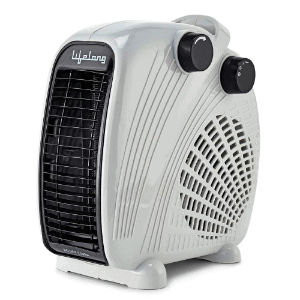
This type of convection heater is suitable for heating up large yet closed spaces. The heating coils will generate heat around it. When the air blows through this space, it gets warmed up. Using a blower fan, this warm air is further distributed within the room. They are capable of distributing warm air evenly and consistently throughout the room. When it comes to price, they are inexpensive.
- Fan Heater are Ceramic or Coil based heaters
- Wattage - 1000w to 2500w
- Price start from 1000
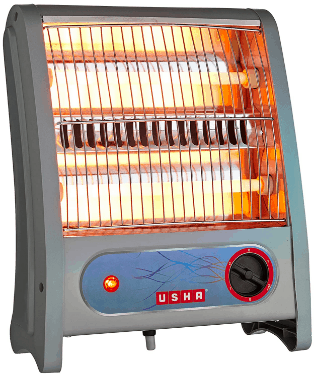
Among all the types, infrared or radiant heaters are the most affordable options. They are suitable for single-person usage or small spaces. They use infrared radiation to heat up the air within the room. As these heaters don’t have fans, they don’t generate any noise. Apart from that, they heat up pretty quickly and use very less energy. But their main drawback is that they are not suitable for heating up large spaces and are not child-safe.
- Infrared Heater are known as Halogen/Radiant
- Wattage range - 400w,800w,1500w
- Price starts from 500
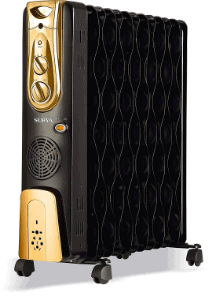
These are the most expensive yet most efficient room heaters. Though they take longer to heat up the room, they are considered the best option as the heat will stay for a longer time even after the heater is turned off. However, they generate a lot of noise.
The main advantage of oil-filled heaters is less electricity consumption, making them an efficient option for areas where heat is required for extended periods of time. As they don’t burn oxygen or decrease humidity, they are considered the best option for newborn babies. In terms of health benefits, they don’t lead to dry eyes, suffocation and skin rashes.
- Oil Filled heaters are generally 7,9,11 and 13 fin. You can choose accordingly.
- Price starts from 6000
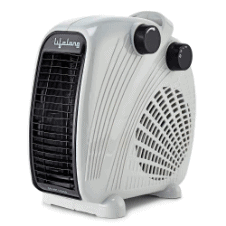
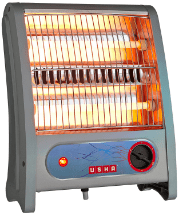
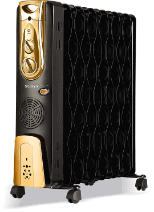
Factor 3. Other Features to look at
Apart from the above two main factors, you have to consider certain features while purchasing a room heater. These features let you analyze the operational quality of the product. We have mentioned them with a clear description below for your reference.
1. Overheat Protection Switch
This feature protects the room heater from getting overheated. This sensor will detect when the components of the heater reach an unsafe temperature and shut it off automatically to prevent further damage
2. Cool-to-the-Touch
This feature is beneficial especially if you have kids or pets at home. Room heaters with this option come with heat-resistant exteriors which prevent any risk of injuries caused by touching the appliance. These models have non-flammable and cool-touch cabinets.
3. Noise Levels
Noise levels generated by room heaters depend on the kind of technology used for generating heat. For instance, radiation or infrared heaters don’t make noise at all. However, oil-filled room heaters or fan room heaters generate a lot of noise. If you don’t like noises or if you use a room heater in the bedroom, then check out the noise levels before making the purchase.
4. Auto turn-off
Having a room heater with an automatic turn off feature provides several benefits. For instance, the user can turn it on and sleep without worrying about turning the heater off. Another benefit is to set the timer and save unnecessary energy consumption.
5. Room Heater for Asthma
Room heaters that generate gases or fumes are not suitable for people dealing with asthma. Gas-based heaters should be avoided if you have any respiratory issues. Fan, radiant and oil room heaters are safe to use for asthma patients as they don’t release any fumes.
6. Best Room Heater brands in India
Below, we have mentioned some of the most reliable and popular room heater brands in India. They are well-known for providing high-quality products, performance, longer warranty duration and customer service.








7. Warranty
Most of the room heater models come with at least 1-year warranty period. Some may provide additional or extended warranty as well. During this duration, the brand will not charge for repairs, service or replacements.

